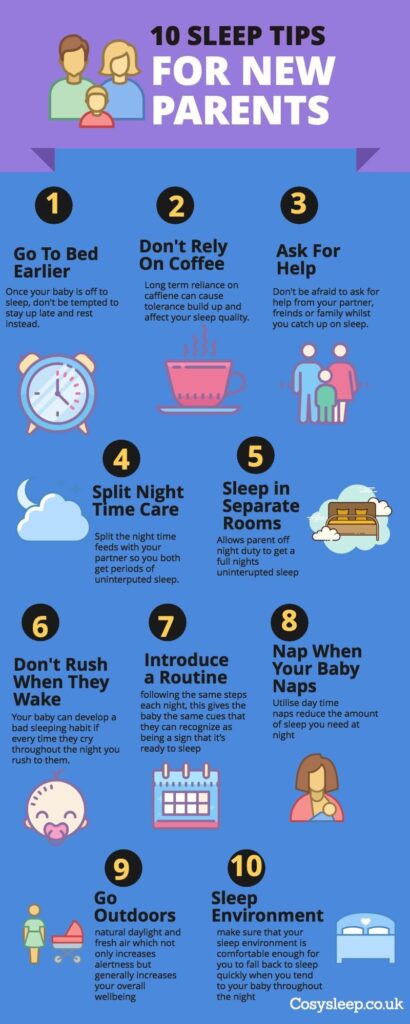Navigating sleep advice for new parents can feel overwhelming, especially with countless stories circulating about sleep deprivation after welcoming a baby. Many expectant parents dread the sleepless nights and relentless demands that come with caring for a newborn. However, seasoned moms emphasize that there are practical sleep strategies to help manage these challenges. Learning to embrace naps, accepting help from loved ones, and prioritizing mental health are crucial aspects of overcoming sleep deprivation during this transformative time. By sharing valuable new parent sleep tips from their experiences, these mothers remind us that it’s possible to find moments of rest amidst the chaos.
Becoming a parent is a joyous yet demanding journey that often comes with unforeseen challenges, particularly in the realm of sleep. Many first-time moms and dads are caught off guard by the reality of late-night feedings and disrupted routines, leaving them searching for effective baby sleep strategies. Understanding the importance of surrendering control and reaching out for support can transform this exhausting experience. By discussing the ups and downs of early parenthood, parents can foster a community focused on overcoming the difficulties of sleep deprivation. Ultimately, establishing a balanced approach to caring for both their baby and themselves is essential for supporting mental health postpartum.
Sleep Advice for New Parents
Navigating the sleepless nights of parenthood can feel overwhelming, but it’s essential to remember that this phase is temporary. As many experienced parents have shared, the key sleep advice for new parents is to embrace the sleep when your baby sleeps philosophy. While it may be tempting to tackle household chores or catch up on other responsibilities during these moments, prioritizing your rest can significantly improve your mental well-being. Allow yourself the grace to adapt your routine and sleep schedule to ensure you get the rest you need.
Moreover, many new parents find that sharing the night duties can help tremendously. Whether it’s switching off with a partner or enlisting help from family members, taking turns can provide critical relief from sleep deprivation. Building a supportive network not only helps with better sleep but also contributes to the overall mental health of both parents in this demanding period.
Effective Baby Sleep Strategies
Establishing effective baby sleep strategies can greatly influence the quality of sleep for both parents and the infant. One popular approach among seasoned moms is to create a calming bedtime routine. This could involve swaddling your baby, dimming the lights, and reading a gentle story, all of which signal to the baby that it’s time to sleep. Consistent routines help condition babies to know what to expect, making the transition into sleep smoother and potentially longer.
Additionally, understanding and recognizing your baby’s sleep cues is critical. Parents often overlook the signs of tiredness, such as rubbing eyes, yawning, or fussiness. By learning to tune into these signals, parents can place their baby in the crib before they become overtired, which can lead to longer and more restful sleep periods. Implementing these strategies consistently, from early on, can lead to healthier sleep patterns as your baby grows.
A little flexibility is also important; sometimes, a baby may need more comforting or extra cuddles, especially during developmental leaps. Parents should remain adaptable to changing sleep patterns rather than adhering strictly to their original plans.
Overcoming Sleep Deprivation as a Team
Overcoming sleep deprivation is often a shared responsibility. New parents may find themselves feeling the weight of fatigue and emotional exhaustion, but it’s crucial to remember that teamwork can ease this burden. Open communication with your partner about waking up during the night or challenges faced can foster a more supportive environment. Whether it is designated nights for each parent to handle midnight feeds or structured time to catch up on sleep, coming together to strategize is essential for sanity.
Moreover, sometimes accepting help from family and friends can make a tremendous difference. If your mother or a close friend offers to help out, take them up on it! Whether it’s watching the baby for an hour or two while you rest or simply providing companionship during the lonely nights, shared experiences can alleviate the strain of sleep deprivation.
Mental Health in the Wake of Sleep Deprivation
Sleep deprivation can have serious implications for mental health, especially postpartum. It’s vital to recognize the signs of emotional distress early on, as many new parents face a whirlwind of feelings ranging from anxiety to depression. Keeping an open line of communication with your partner about these feelings can help ensure both partners are aware of mental health needs during this challenging time.
Additionally, proactive measures such as scheduling time for self-care, seeking therapy, or participating in support groups can help maintain mental wellness. Many mothers recommend journaling or mindfulness practices to help process the whirlwind of emotions faced during early parenthood. Building these habits early on can provide lasting benefits well beyond the baby years.
Finding Support During Sleepless Nights
The journey of new parenthood can feel isolating, especially during sleepless nights. Finding a support network can be invaluable. Connecting with other new parents—whether online, through local groups, or at parenting classes—can provide not just camaraderie but also practical sleep advice and shared experiences. Knowing you are not alone can help alleviate the stress and pressures that come with disrupted sleep.
Many parents also recommend utilizing technology to help foster these connections. Online forums, social media groups focused on parenting, or apps designed for new mothers can facilitate sharing experiences and tips in a supportive environment. These platforms can be particularly beneficial for seeking help during the more chaotic nights when sleep feels like an elusive dream.
The Importance of Self-Care for New Parents
In the whirlwind of caring for a newborn, it can be easy for new parents to neglect self-care, which is crucial for overall well-being. Simple practices like taking a few moments to breathe, indulging in a warm shower, or enjoying a quiet cup of tea can significantly impact a parent’s mood and energy levels. Make self-care a priority; as they say, you cannot pour from an empty cup.
Moreover, self-care doesn’t need to be grand or time-consuming. Small acts of kindness toward oneself can build resilience against the fatigue and stress that come with sleepless nights. Finding pockets of time to decompress—whether through short walks, reading, or engaging in hobbies—can refresh your mind and body, priming you for the challenges of parenthood ahead.
Trusting Your Instincts Over Online Advice
In the age of the internet, it’s easy for new parents to get overwhelmed by an avalanche of conflicting sleep advice. However, trusting your instincts is crucial. While researching parenting topics can be helpful, avoid getting too lost down the rabbit hole of online advice. Instead, focus on what feels right for you and your baby. Each baby is unique, and what works for one family may not work for another.
Having a reliable support system to discuss concerns with can help filter out the noise the internet often brings. By discussing your experiences with other seasoned mothers, you can gain insights grounded in reality instead of hypothetical advice that may not be applicable.
Adjusting Expectations as a New Parent
As new parents experience the multifaceted journey of raising an infant, adjusting expectations becomes a vital part of managing sleep deprivation. It’s important to accept that not every night will be smooth sailing. Some nights will be filled with challenges, while others might allow for a bit more rest. Remembering that sleepless nights are a part of the learning curve can help parents cope easier with the transitions.
Moreover, reframing perspectives on sleep can be beneficial. Instead of viewing a bad night as a failure, try seeing it as a shared learning experience for both you and your baby. Developing patience and accepting the fluctuating rhythm of early parenthood can cultivate a sense of peace amid the chaos. Remind yourself that this too shall pass, and try to focus on nurturing your relationship with your baby over the quest for perfect sleep.
Creating a Sleep-Friendly Environment for Baby
Establishing a calming, sleep-friendly environment for your baby is paramount to encourage better sleep quality. Consider factors such as lighting, temperature, and noise levels. Keeping the nursery dimly lit and at a comfortable temperature can create a soothing atmosphere conducive to sleep. Additionally, using white noise machines or soft lullabies can drown out unwanted interruptions, providing a sound blanket that aids in settling your baby.
Furthermore, paying attention to the baby’s sleepwear and bedding choices is important. Opt for soft, breathable fabrics that allow comfort and safety. The idea is to create a little sanctuary for your baby, where they feel secure and relaxed. This supportive sleep environment can foster better sleep habits, ultimately benefiting both parents and their little ones.
Frequently Asked Questions
What are some new parent sleep tips to overcome sleep deprivation?
New parent sleep tips focus on taking short naps when your baby sleeps, prioritizing sleep over household chores, and asking for help from friends or family. Remember that sleep deprivation is common among new parents, and it’s essential to communicate when you’re feeling overwhelmed.
What baby sleep strategies can help me and my partner get more rest?
Effective baby sleep strategies include establishing a calming bedtime routine, considering co-sleeping (safely), and utilizing white noise machines to soothe your baby. Don’t hesitate to rely on support from loved ones during your baby’s early months to catch up on much-needed rest.
How can I manage sleep deprivation while supporting my mental health postpartum?
To manage sleep deprivation and support your mental health postpartum, ensure you communicate openly with your partner about how you’re feeling. Adequate sleep is crucial; seek professional help if you notice signs of depression or anxiety, and always reach out to your support network for assistance.
What should I know about sleep advice from moms regarding baby sleep?
Sleep advice from moms often emphasizes the importance of surrendering to the baby’s sleep schedule and letting go of the need for a perfect routine. Many moms recommend taking every opportunity to nap and reassuring new parents that sleep phases change and improve over time.
How do I handle sleep deprivation as a new parent?
Handling sleep deprivation as a new parent involves embracing the phases of baby sleep patterns, resting whenever possible, and not being afraid to ask for help. Consider embracing a flexible schedule that allows you to maximize sleep during challenging nights.
| Key Points | Advice from Experienced Parents |
|---|---|
| Let go of unrealistic sleep expectations | Treat napping as a priority and seize opportunities for rest |
| Communicate sleep deprivation issues to trusted people | Do not hesitate to ask for help when needed |
| Understand that sleep challenges are temporary | Your baby will develop better sleep patterns over time |
| Avoid excessive information from the internet | Seek advice from experienced parents instead of online sources |
| Monitor mental health during this overwhelming phase | Recognize the signs of sleep deprivation impacting well-being |
Summary
Sleep advice for new parents often emphasizes that while the early days can be exhausting and filled with wakeful nights, it is important to remember that this phase will not last forever. Listening to the experiences of other parents can provide valuable insights on how to cope with sleep deprivation. The key takeaways include prioritizing naps, communicating your struggles, and understanding that sleep challenges are temporary. With time, your baby’s sleep patterns will normalize, and restful nights will return. Be gentle with yourself, ask for help, and focus on the basics: keeping your baby safe, fed, and loved.
Unlock the power of intelligent content creation with Autowp, your go-to AI content generator and AI content creator plugin for WordPress. Seamlessly designed to enhance your blogging experience, Autowp leverages cutting-edge technology to produce high-quality, engaging content that captivates your audience and improves your site’s SEO performance. Whether you’re a seasoned blogger or a business owner looking to expand your online presence, Autowp provides you with the tools you need to succeed. To remove this promotional paragraph, upgrade to Autowp Premium membership.



